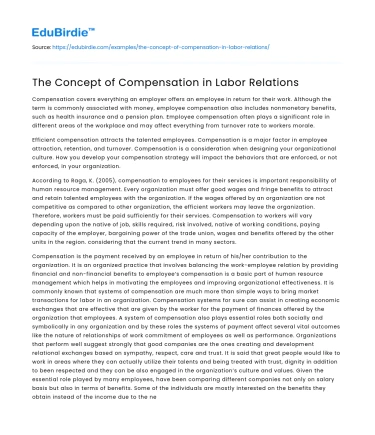Compensation covers everything an employer offers an employee in return for their work. Although the term is commonly associated with money, employee compensation also includes nonmonetary benefits, such as health insurance and a pension plan. Employee compensation often plays a significant role in different areas of the workplace and may affect everything from turnover rate to workers morale.
Efficient compensation attracts the talented employees. Compensation is a major factor in employee attraction, retention, and turnover. Compensation is a consideration when designing your organizational culture. How you develop your compensation strategy will impact the behaviors that are enforced, or not enforced, in your organization.
Save your time!
We can take care of your essay
- Proper editing and formatting
- Free revision, title page, and bibliography
- Flexible prices and money-back guarantee
According to Raga, K. (2005), compensation to employees for their services is important responsibility of human resource management. Every organization must offer good wages and fringe benefits to attract and retain talented employees with the organization. If the wages offered by an organization are not competitive as compared to other organization, the efficient workers may leave the organization. Therefore, workers must be paid sufficiently for their services. Compensation to workers will vary depending upon the native of job, skills required, risk involved, native of working conditions, paying capacity of the employer, bargaining power of the trade union, wages and benefits offered by the other units in the region. considering that the current trend in many sectors.
Compensation is the payment received by an employee in return of his/her contribution to the organization. It is an organized practice that involves balancing the work-employee relation by providing financial and non-financial benefits to employee’s compensation is a basic part of human resource management which helps in motivating the employees and improving organizational effectiveness. It is commonly known that systems of compensation are much more than simple ways to bring market transactions for labor in an organization. Compensation systems for sure can assist in creating economic exchanges that are effective that are given by the worker for the payment of finances offered by the organization that employees. A system of compensation also plays essential roles both socially and symbolically in any organization and by these roles the systems of payment affect several vital outcomes like the nature of relationships of work commitment of employees as well as performance. Organizations that perform well suggest strongly that good companies are the ones creating and development relational exchanges based on sympathy, respect, care and trust. It is said that great people would like to work in areas where they can actually utilize their talents and being treated with trust, dignity in addition to been respected and they can be also engaged in the organization’s culture and values. Given the essential role played by many employees, have been comparing different companies not only on salary basis but also in terms of benefits. Some of the individuals are mostly interested on the benefits they obtain instead of the income due to the needs of the family or their lifestyle aspects, like coverage on health care and financial planning. If a person owns a business, the compensation of his employees and the package of benefits may comprise of the reason an individual does or does not accept the offer of your job. In making your company to be more competitive and also attractive to candidates who are highly qualified, one ought to offer benefits which are more desirable and make this an essential component in the process of planning. For instance, if one has to hire more, they should retain the topmost employees (Raga, K 2006:45).
Compensation in relationships of employment, it is as well likely that it plays an essential part to shape the fact that people have the feeling that individuals are treated with trust dignity respect and if they have the belief that the organization’s culture and values are creditable of their whole commitment and highest hard work.






 Stuck on your essay?
Stuck on your essay?

